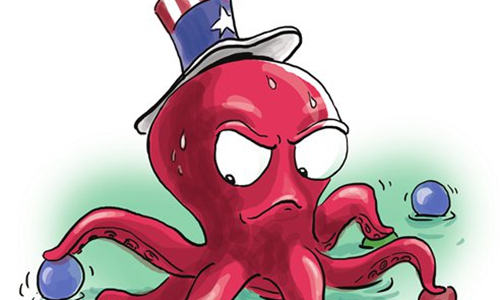US chaos sows discord on dark Independence Day: Global Times editorial
Source:Global Times Published: 2020/7/5 21:13:40

Illustration: Liu Rui/GT
This year's July 4 must be one of the most confusing Independence Day anniversaries since the US declared independence 244 years ago.US President Donald Trump delivered a widely criticized speech, in which he said the ongoing protests are a "left-wing cultural revolution" designed to "overthrow the American Revolution." His remarks were criticized as a campaign speech aimed at consolidating his white supporters, and as giving deliberate offense to a group of Americans in order to please some voters. Critics accused Trump of not addressing all Americans and even failing to bridge the differences.
This year's Independence Day celebration is indeed unusual. The superpower has become one of the most fragile countries during the COVID-19 pandemic. Its ability to control the pandemic and its adherence to humanitarianism have both fallen to the lower limits of human society. No matter how the US government explains the situation, it will seriously harm Americans' sense of pride and the world's respect toward the country.
The US is being hijacked by a radical political culture and has lost the calmness and stability of a superpower in formulating policies. The US no longer inspires other countries but coerces them in almost all aspects. Today's US is consuming the precious resources it has accumulated over more than two centuries.
In developing countries like China, many people used to regard the US as a role model. But now, especially since the beginning of 2020, the Chinese public has refreshed its understanding of the US and found it has many institutional weaknesses and even discovered American society's serious resistance to scientific rules. Now must be the most damaging period for the US' international image in a long time.
The US' internal divisions far exceed the country's political pluralism, turning into real antagonism between different forces. Anti-racial discrimination protests broke out in late May and are now beyond society's control. Conflicts among different forces in the US have increasingly broken through the country's constitutional regulations and have become zero-sum. This is definitely not a good sign for a major power.
The demographic changes in the US are approaching a critical point, imposing huge pressure on the US' basic value structure. The concept of "mainstream" is changing.
Should the US conform to the trend and keep revising its original mainstream value system, or should it insist on the traditional mainstream national identity of white people, Christianity and the English language? This is a hard choice. Changes are inevitable and every change can be painful.
The situation since the beginning of 2020 shows that the US lacks political power to bridge differences and unite society as a whole. Some US political elites are trying to unite society and win over voters by escalating the confrontation against China. This is extreme nationalism and a retrogression of political civilization.
Most importantly, facing all these problems, the US sees no way out. It is muddling along. Very few US political elites are sincerely committed to solving these problems. Most are trying to gain more personal benefits from chaos.
Are these problems signs of the US' decline? It is risky to predict a major country's future. But if people really see the US' decline in the future, then historians will definitely make in-depth analyses about the year 2020, and they will likely regard this year as a key marker of a decline in the country's prosperity.
Going back a century, China respected "Mr Democracy" and "Mr Science" from the West. Likewise, the US should regain its true democratic and scientific spirit. It should abandon the long-standing alienation of its system, remove the increasingly solidified prejudice, fully restore its vitality and revive the strong competitiveness that brought the country all the way to the top of the world.
Posted in: EDITORIAL